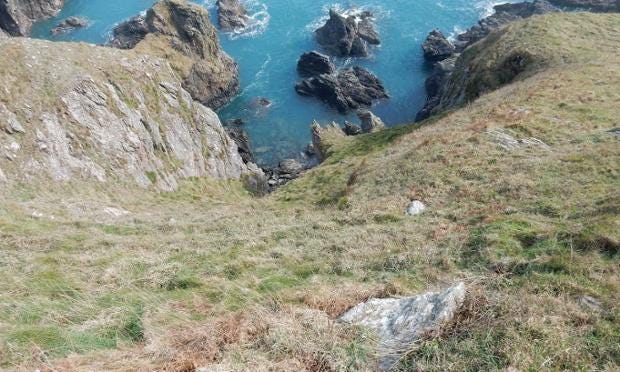
THE THREESOME
Jenny and Torsten lived in what anyone who knew them whose opinion they attached any value to agreed was a fabulous little house, backing onto a cliff: not what was generally perceived to be one of the most desirable cliffs in the area, but a real find, nevertheless. Right off the bat the landlord said that because of the steep and sudden drop the place wasn’t suitable for pets or children but that was fine because Jenny and Torsten lived very functionally minus both and figured they could continue to without anything bursting into flames. Eight years into their tenancy, the rent hadn’t gone up: a fact that, with every summer that passed and every accompanying turn the world made towards a harsher and more competitive destination, contributed to an increasing feeling of blessedness, if not total security. Jenny asked Torsten not to wee off the edge of the cliff because it made her nervous, and more to the point it was an unpleasant habit, and he promised her he wouldn’t but, in secret, continued to do so. One night she surprised him by creeping up with astounding stealth behind his left shoulder as he was mid-piss and shouting “BOO!” then running off sideways into the black night, giggling. As a style of joke, it didn’t seem like her at all – obscure wordplay and sarcasm were more her line – so it was not as great surprise as it might have been to him when he returned to the house and found her fast asleep in bed, nor when he realised, through a series of other abrupt mischiefs, that he was now living with two versions of his spouse: her cautious familiar solid corporeal self, and her ghost, who had somehow been spawned, possibly through an administrative error, while she was still living and who embodied all the devilish and boisterous parts of her that she would by general principle suppress and condemn. Some interesting months followed, soon coalescing into a new normality: not as serene or comfortable as the one that had preceded it but by no means wholly disagreeable. When everyone finally grew apart and broke up and moved to closer to their families it was undoubtedly a sad state of affairs, but they all agreed that these things just happen sometimes and there’s nothing you can do about it.
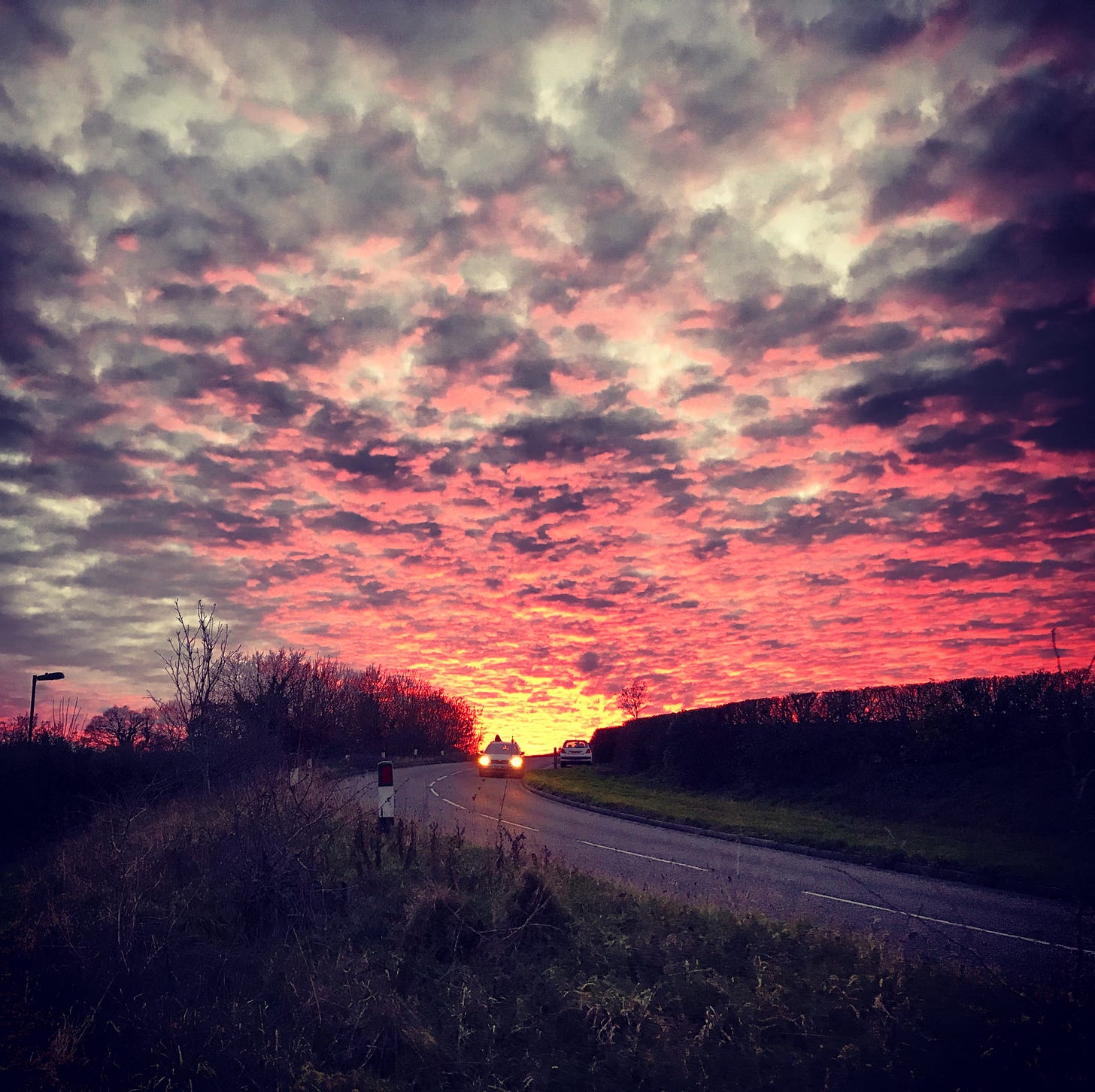
SUNDOWN
As I drove over the brow of the hill, far from home, admiring the finest sunset of the year, I hit a real mad industrial grade bastard of pothole. I might not have hit the pothole if I had been concentrating properly on the road instead of looking at the sunset, but I can’t certify that and, besides, how are you supposed to not turn your gaze on something like that? It looked like the entire heavens, all however many trillion square miles of them, had met in fiery pink harmony to reveal their secrets all at once! The guy at the garage, which I very fortunately found at only half a mile away at the bottom of the hill, told me that people had been falling foul of the pothole all week. It had, in fact, brought the establishment a flood of unexpected business at a serendipitous time. “Are you sure your boss didn’t hollow it out himself with a pick-axe, in the dead of night?” I asked. “I wouldn’t put it past him,” he whispered, with a quick theatrical look over his shoulder. He wore a navy blue padded jacket and was about medium height, medium build, nothing too interesting about his hair or jawline or shoes. After his colleague had fitted the new tyre, he studiously worked out the VAT on a small calculator and informed me that the total cost, plus labour, would be £81.49. I paid by tapping my card, which you can do now, even when things are expensive, and thanked him. “If we are being honest and looking the facts directly in the face, it’s very unlikely we’ll see each other again,” I said, stopping briefly at the door. “So I suppose this is goodbye forever.”
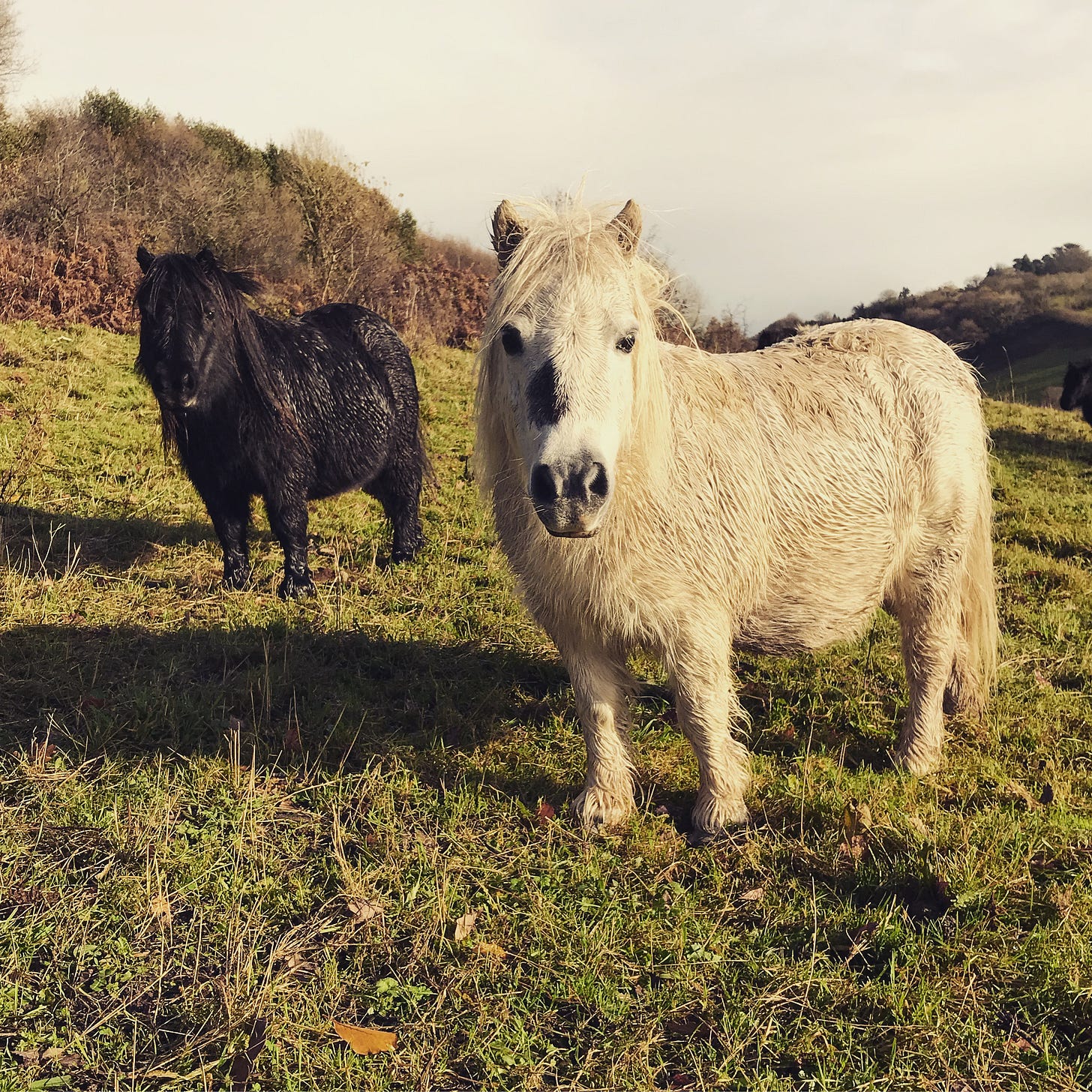
THE VAUXHALL CAVALIER ESTATE
Back then, it was generally just CDs that people listened to in their cars, and Mike and Vicky only had two: The Best Of REM and that Seal album that everyone bought at one point, the one with ‘Crazy’ on it and the song he did with Adamski. On their way home from the surveyors office where they worked, invariably listening to one of the two albums, he and Vicky would often pull over into a gate gap a mile from home and say hello to the two Shetland ponies who lived in the field there. The most personable of this pair of absurd microhorses had a spiky mane which always looked a bit like he’d gelled it in a misguided attempt to look punk. “I know how this will go,” said Vicky to the pony, on what must have been at least the dozenth time she and Mike visited the field. “You’ll come over, hoping we have food, then when you see we haven’t, you’re going to fuck off, just like always.” The pony looked up. “That’s where you could not be more wrong,” he announced, nudging open the gate with a velvety nostril. “You need to be less cynical and have more faith in others, especially ponies.” Vicky pulled a leaver to tilt the passenger seat forward so the pony could get into the back, which he did, surprising the young lovers further by remarking with what was obviously authentic enthusiasm about the presence of the Seal CD and making his feelings known, not a little haughtily, that REM were at their core a proper album band who could only be diminished by a “hits” collection. It was a tight squeeze and Vicky was glad she had overruled Mike and insisted on a larger car than the one they had originally been considering.
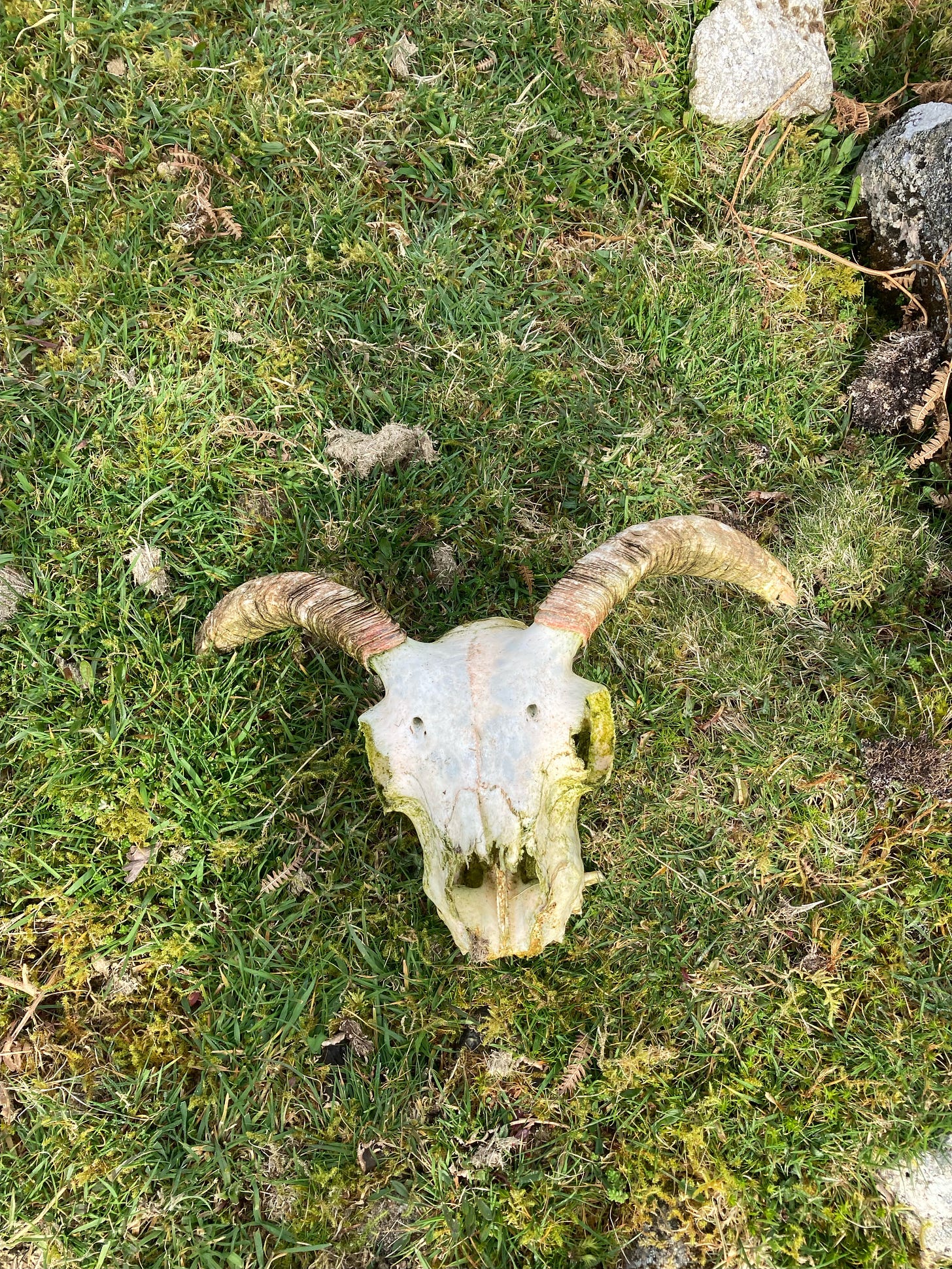
ELIZABETH’S SUNDAY
I went on a walk. It wasn’t great, to begin with: one of those walks in your walking book that you do just because you’ve already ticked off all the more attractive ones. All the trees seemed to be busy doing important tree stuff elsewhere, spring didn’t appear to be happening with anything like the enthusiasm it was an hour away, and sheep bones appeared on the spongy ground every eighty or ninety steps as if to underline a slew of stark suspicions I’d had lately about the harsh truth behind everything. I put a sheep skull in my backpack. I’d have probably put more in there were it not for the fact it was a very small backpack. After three or four miles, I passed under the shadow of a steep hill spotted with clitter and other geological anomalies of the region to reach a tiny hamlet: five houses at the very most. A barn with a corrugated iron roof rusted dried blood red and about 2/3 of its brickwork remaining. One of those portentous Judgey McJudgerson stallions keeping an eye on your every move from a grassy ledge. You know the kind of place. Further down the hill was a lonely cottage with peeling paint and what I thought was a sad-haired mannequin in its living room window but, when I knocked on the door, turned out to be the house’s owner. “I’m looking for a place to live,” I told him. That’s how it happened. Just like that. I mean, it just came out. I’d not planned any of it. No thought for my soon-to-expire three hour parking ticket, the Airedales, or Greg. The cottage’s owner said his name was Ivan and that I could make the spare room for the foreseeable future, although the mattress on the bed was old, and I’d probably be wise to favour the left side, otherwise the springs might dig into my ribs and spine. “Don’t worry,” he added. “That stain is coffee, not summat else.” That night we watched an early James Bond film. I forget which one it was but it was the one where Sean Connery attaches a seagull to his head as an underwater disguise. Ivan didn’t seem to feel as strongly as I did about how problematic the secret agent was as a human being but we both agreed that the seagull was superfluous when merely being underwater would have been enough of a disguise in itself. Afterwards, Ivan made us a broth. “You’ll be surprised ‘ow much flavour you can tease out of these, even at this stage,” he said, adding my sheep skull to the pan. He apologised for the lack of central heating but pointed to a giant coat of a not dissimilar colour to the moss on the stone wall delineating the garden and said I’d be welcome to grab it off the peg if I wanted, adding that it was one that had seen his aunt through several harsh winters tending to her geese in the 1940s, and, as an aside, that she wasn’t really his aunt, just someone he lived with who he came to view as his aunt, over the fullness of time. I slept more soundly than I had in months and was at the academy bright and early to meet the parents of the following year’s prospective pupils and explain all the benefits they would be getting for their money. I’d left my opening speech at home and had not washed or brushed my hair but it didn’t matter. As I shook hands and said all the right things, in my new big old coat, I felt better than I had for a while.
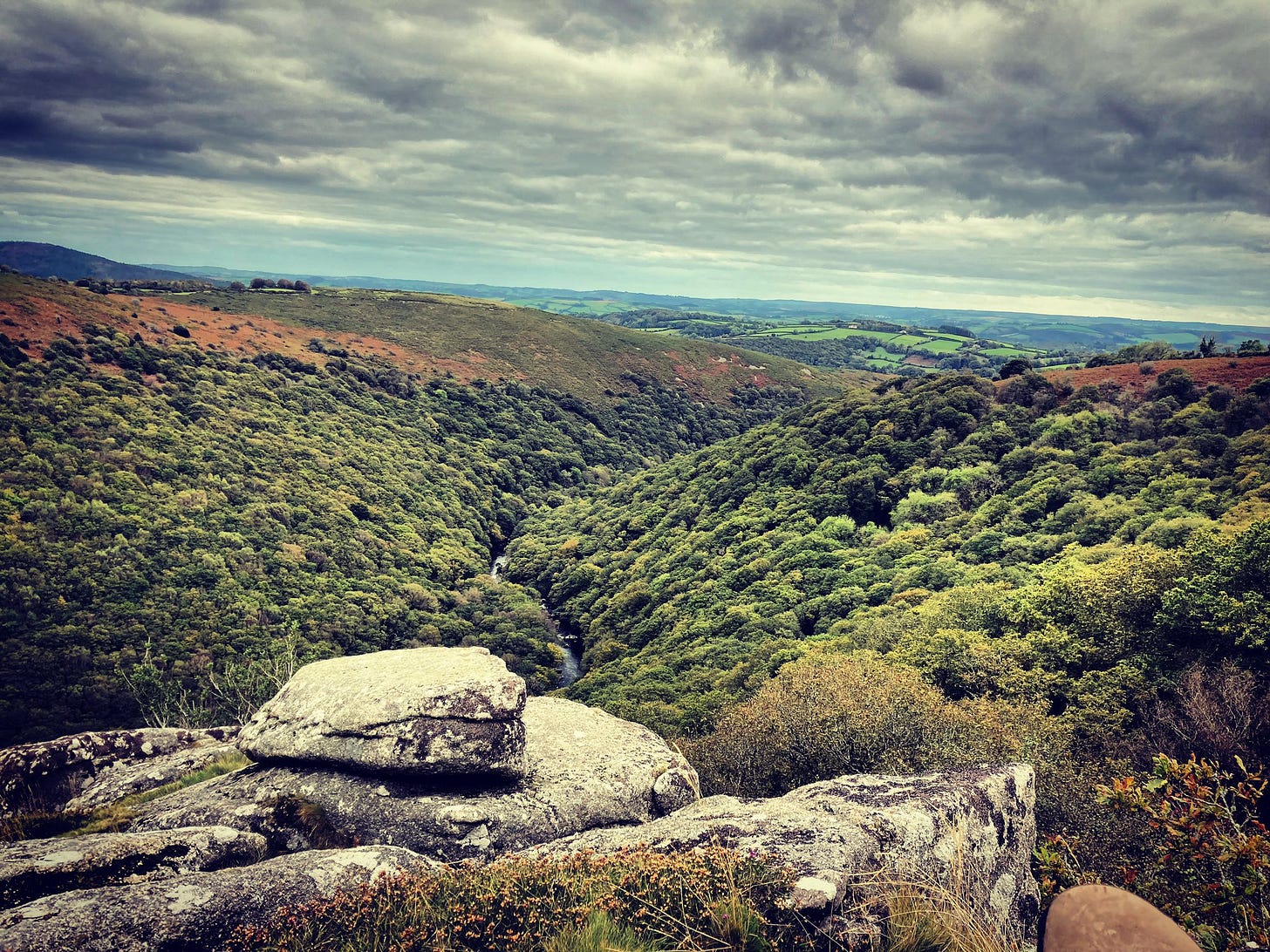
BIG BAD WALDINO’S HALLOWEEN BREAST
Big Bad Waldino’s Halloween Breast was a man who’d targeted Ian, a sporadically successful TV scriptwriter, with numerous forms of social media harassment during the mid 2010s. It was nothing especially unusual by the standards of the time. “I’m going to come over and kill both of those nephews you keep banging on so nauseatingly about, and their little twat of a guinea pig,” Big Bad Waldino’s Halloween Breast would type, using Big Bad Waldino’s Halloween Breast or another opaque false name, accompanied by a blank avatar. After Ian blocked his account it would never take long for him to pop up again under another pseudonym. Ian could tell it was the same guy. “Ian Welldon is the worst writer in Britain and if he ever gets cancer of the bumflaps I’m going to have a party,” BBWHB would declare. “I’ll pay for the venue hire. Who else is in?” Out of the natural anthropological curiosity that went hand in hand with his trade, Ian couldn’t help checking out the rest of Big Bad Waldino’s Halloween Breast’s online output and was always particularly befuddled at the way the death threats to minor and major public figures sat alongside various statements by Big Bad Waldino’s Halloween Breast demonstrating to the wider universe, or perhaps to some deity inside the internet, what a great and rigorously correct-thinking person Big Bad Waldino’s Halloween Breast was, morally and politically. “I don’t know how you stay so calm about it,” said Sharon, Ian’s wife, who, though an ostensibly pacifist presence, still retained traces of her past as someone who had stepped in frequently on behalf of friends and, disregarding considerations of gender or size, comprehensively lamped numerous disorderly individuals outside nightclubs in Welsh Border Country. “It’s so relentless and unprovoked. I wish I knew who he was. I’d go and slap seventeen shades of shit out of the cunt. In a way it seems a shame that it isn’t the olden days and you can’t just both have a fight in the street to settle it. I feel sure you’d win.” But, through some inventive online searches, Ian had long since discovered Big Bad Waldino’s Halloween Breast’s real identity, and he was just quietly biding his time, having been advised many years ago by his grandma that revenge was a dish best refrigerated at an extremely low temperature. Almost precisely forty six years later, having located the care home where Big Bad Waldino’s Halloween Breast was spending his final days, distracted the orderlies and casually wheeled him into the back of a van he’d hired specifically for the day’s plans, Ian – now a widower whose career had long since descended into anonymity – drove an exceedingly out-of-it Big Bad Waldino’s Halloween Breast through the first rumblings of a storm up numerous winding country lanes to the edge of a three hundred foot rocky ravine, but lost heart just as he was about to dispatch his tormentor into the jagged granite abyss. “What is the real gain in all this, for anyone?” he wondered, evaluating the uncomprehending mollusc at his hip. At that precise moment, a prong of forked lightning hit the metal spokes on Big Bad Waldino’s Halloween Breast’s wheelchair, killing both former social media users instantly. The hikers who found their bodies an hour later – and those who learned about the tragedy later in the local news – remarked on how heartbreaking, and in a way strangely sweet and neat, it was that these two old frail men, who had surely been close friends for decades, had met their demise in such a way, and, with nobody remaining on the planet to contradict it or pedantically set the facts straight, that became the story everyone told, until those people died too or became preoccupied with other stories, some of which were true and some of which weren’t.
My latest book, Villager, is now out in paperback. You can subscribe to my Substack page here.


Oh! You’re getting better & better. More droll, more ridiculous, more to-the-point about absurdist beauty & bang-your-brain splendor etc etc
Write on!